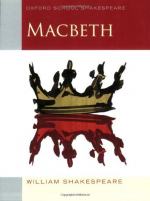|
This section contains 4,737 words (approx. 16 pages at 300 words per page) |

|
SOURCE: Low, Lisa. “Ridding Ourselves of Macbeth.” Massachusetts Review 24, no. 4 (winter 1983): 826-37.
In the following essay, Low contends that Macbeth is sympathetic to audiences in his remorsefulness, and that he guides the drama toward a possible path of redemption.
But where there is danger, There grows also what saves.
Hölderlin
Unlike most tragic heroes, Macbeth is much less sinned against than sinning, which makes him a strange candidate for our affections.1 He does not fall prey to infirmity like Lear, nor is he ignorant of what he does like Oedipus. He is not like Romeo, well-intentioned but too hasty; nor is he like Hamlet, Romeo's inverse, too cool. Too hot to stop, too cool to feel, Macbeth is no Romeo and no Hamlet. He is a fiend and a butcher. Standing before him, we cannot but be paralyzed with fear.
And yet, almost against our wills, we...
|
This section contains 4,737 words (approx. 16 pages at 300 words per page) |

|


